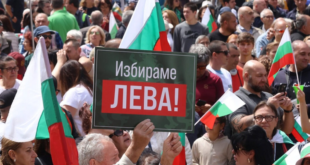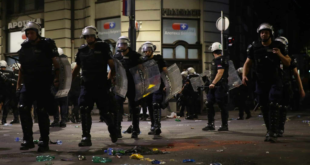 During the past few weeks, the republic of Kabardino-Balkaria has been in the Russian news for three separate and important reasons. First, there has been a marked increase in the activity of the local mujahideen.Second, the investigation of the Nalchik attack (which occurred in October 2005) has been officially concluded. And finally, a celebration of the 450th anniversary of Circassia’s incorporation into the Russian state is slated for the early days of September.Â
During the past few weeks, the republic of Kabardino-Balkaria has been in the Russian news for three separate and important reasons. First, there has been a marked increase in the activity of the local mujahideen.Second, the investigation of the Nalchik attack (which occurred in October 2005) has been officially concluded. And finally, a celebration of the 450th anniversary of Circassia’s incorporation into the Russian state is slated for the early days of September.Â
Guerrilla activity has increased during the past month, with Kommersant covering the events occurring in the south of the republic on the Russo-Georgian border (Kommersant, August 18 and September 7). A powerful explosive device was found in this district on August 16, while on August 18, a policeman was killed during an attack on a police checkpoint. When detectives arrived to investigate the murder, a nearby bridge was destroyed by a massive explosion, though no additional casualties were caused, according to Kommersant. Attacking small targets in order to lure larger groups of security personnel into a trap is a favorite tactic of the guerillas in the region, with the same tactic being used three separate times in assassination attempts directed at Dagestan’s interior minister. On September 7, three bombs exploded in the Elbrus district, with Oleg Zharikov, the attorney general of Kabardino-Balkaria, indicating that this was probably an attempt to kill policemen. According to Kommersant, “Wednesday night (September 5-6) was marked by a series of explosions, apparently signifying the local insurgents’ celebration of the incorporation of Kabarda into Russia.”
Â
The whole 450th anniversary celebration is a widely publicized PR action fabricated by the Kremlin, with Russian President Vladimir Putin even signing a special decree in September 2006 about this issue. In February 2007, a special commission was created in Moscow in order to deal with the anniversary celebration and Deputy Prime Minister Sergei Naryshkin, a close Putin ally and supposed presidential successor, was appointed as its chairman.
Â
According to the ITAR-Tass news agency on September 7, “a celebratory parade was held on Friday [September 7] in the center of Nalchik in order to mark the 450th anniversary of the incorporation of Kabardino-Balkaria into Russia. The parade was the opening act for three days of festivities, with participants including Southern Federal District Presidential Representative Dmitry Kozak and Deputy Prime Minister Sergei Naryshkin.”
Â
Such festivities are simultaneously occurring in three different republics located on the old Circassian lands – Adygeia, Karachaevo-Cherkessia, and Kabardino-Balkaria. “The simultaneous celebrations of the 450th anniversary of the incorporation of the three republics into the Russian state are a meaningful fact that underlines our political unity in a so-called culturally Russian world,” Naryshkin stated during his visit to Nalchik in June 2007 (ITAR-Tass, June 26). Not only did he explain the ideological goals of the undertaking, but he also spoke about the financial aspects, a not insignificant part of the whole affair, since the Kremlin is spending a total of 900 million rubles (.5 million). The celebration is supposed to consist of two parts, with local festivities occurring in the republics from September 7 to 10 and then continuing in Moscow from October 5 to 7.
Â
Despite the generous budget and the massive propagandist push, this Soviet-style celebration has not been supported by the public. Most Circassian social and national organizations have already criticized this holiday. The Circassians believe that the Kremlin has deliberately twisted the history of the Circassian people who had fought against Russian rule for several centuries in defense of their freedom. By taking the current approach, Moscow has attempted to neutralize any questions regarding the problems of the historic Russo-Circassian relationship. The use of “mass holidays,” such as this one, is a well-known ploy from the history of the USSR and the resuscitation of this “Communist method” by today’s Russian government clearly shows Moscow’s weakness in the Caucasus and its attempt to create an illusion of stability in a place where problems have become essentially unsolvable.
Â
On August 18, the Kavkazky Uzel news agency reported that 10 attacks on members of the security services occurred just this summer in Kabardino-Balkaria. A total of 40 security personnel have been killed in small ambushes and large militarized guerrilla actions in the years since 2003. The current rise in insurgent activity has occurred at a time when the investigation of the 2005 attack on Nalchik has been concluded.
Â
The accusations leveled by the Attorney General’s office were upheld by Russian Deputy Attorney General Ivan Sydoruk. These accusations have been criticized not only by human rights organizations, but also by those politicians known to be close to the Kremlin. Members of the Caucasus resistance laughed at them outright, since the Attorney General’s office indicated that the attack was headed by Chechen president Aslan Maskhadov, an allegation difficult to believe because Maskhadov was killed a year earlier. On August 18, Gazeta.ru cited the words of the pro-Kremlin Duma representative Aleksandr Khinshtein, who said that “the Russian Attorney General’s office lives in a different temporal dimension.”
Â
Another interesting aspect in how the Russian security services view the Nalchik attack lies in the way in which it is labeled a “terrorist act”. High-ranking officials never suggest that this “terrorist” action was brought about by al-Qaeda or similar Arab groups, but instead suggest that it was instigated by Western intelligence agencies. Such ideas have been voiced in the government-controlled media (for example, the “Who makes friends against Russia” [Kto druzhit protiv Rossii] article published on May 25, 2006 in the Severnyi Kavkaz newspaper) and even in open denunciations. Thus, Arkady Edelev, the Deputy Interior Minister of the Russian Federation, stated that “Anzor Astemirov, the leader of the Nalchik guerrillas, was connected with the intelligence agencies of Western countries hostile to Russia, countries that are planning a blitzkrieg in South Ossetia, Abkhazia, and the Transcaucasus” (Novosti, October 17, 2006; Interfax, July 1). It seems that the image of the West as a hostile monster organizing “terrorist acts” inside Russia is becoming a popular propaganda image for the Kremlin, with the “Western tracks” of Nalchik even appearing in connection with the London poisoning of former Russian operative Litvinenko.
Â
Following the announcement that the Nalchik investigation had been concluded, it was declared that trials will begin in September. Analysts are inclined to see this as one important motivating factor for the recent bout of guerrilla activity in Kabardino-Balkaria. Fifty-nine persons have been indicted in the Nalchik case, with 10 of them accused of committing the most severe crimes of the Russian criminal code, including “terrorism” and “attempt to overthrow the government.” Thirteen of the indicted have been amnestied and an additional 24 have been declared wanted. Construction is underway at the Ministry of Internal Affairs base outside of Nalchik in preparation for the trial. It is clear that the authorities are unwilling to conduct the process in the court building in the city, with authorities noting that the increased security measures are meant to prevent another mujahideen attack aimed at freeing the prisoners.
Â
Increases in the military and security presence do not always increase safety, especially in the North Caucasus region. According to the Russian media, additional FSB, GRU, and Ministry of Internal Affairs divisions were stationed in Kabardino-Balkaria on the eve of the anniversary celebrations. This did not prevent, however, the guerrillas from successfully carrying out eight bombings near military and police posts in the month before the planned festivities.
Source: The Jamestown Foundation
 Eurasia Press & News
Eurasia Press & News



